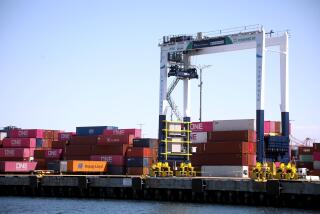DWP Cuts Off Subsidy for Electric Cars
- Share via
The Los Angeles Department of Water and Power has cut off a subsidy of more than $20,000 a month to its financially struggling partner in a costly venture to produce a commercially viable electric car.
The DWP, which has invested more than $4 million in the project, had been propping up the partner--Swedish-owned CleanAir Transport--since late last year, as the company struggled to raise the millions of dollars promised to put the experimental vehicle into production.
When the company failed to raise the funds by a June 30 deadline, the DWP cut off the financial support that paid for most of CleanAir’s overhead--including salaries, rent, travel and even its phone bill, said John Schumann, DWP manager of research and development.
But he said the DWP will give the firm additional time to pursue potential investors before it enforces its contract and forecloses on CleanAir’s remaining assets--primarily two prototype cars and research and design materials.
“If they don’t come up with an investor in the next several months, we will have to reassess,” Schumann said.
Schumann said he believes CleanAir is “within a whisker” of landing a new financial partner. “When they get their cornerstone investor, the game’s back on,” he said.
E.J. Constantine, chairman of the American arm of CleanAir, said he is negotiating with two “strategic partners” that he could not publicly identify. “There will be a decision one way or another in July,” Constantine said.
But the company has routinely missed such self-imposed deadlines and is years behind schedule for raising funds and meeting its production contract, officials acknowledged. Under the original contract, cars were to be delivered in 1992.
Even the leading proponent of the DWP’s electric car initiative, City Councilman Marvin Braude, said Thursday that “time is running out” on CleanAir. He added that he is skeptical about some investors who are negotiating with the company.
Braude acknowledged it may be time to “move ahead to other agendas” in the electric car field.
Southern California Edison was to be a partner with the DWP in the venture and share in a planned investment of $7 million. Edison initially gave CleanAir $500,000. But the utility balked at releasing any additional funds when CleanAir failed to raise the financing it promised.
Despite CleanAir’s failure to raise the necessary funds, the DWP released its half of the $7-million award to the company and the utility was awarded rights to all of the company assets in the event of its collapse.
CleanAir has said it needs to raise $30 million to $40 million to start building the cars. CleanAir, which was founded for the purpose of winning the DWP award, is under contract to produce for sale in Los Angeles 1,000 of the two-door, hatchback vehicles in 1993 and as many as 30,000 a year by 1995.
Constantine, who had been a consultant to the DWP under a $350,000 contract before joining CleanAir as chairman in February, said the company can “keep going for a limited time” without the DWP subsidy. But he acknowledged that virtually all of the money the company has raised in the last four years has been spent.
The CleanAir vehicle, known as the LA301, seats four and would sell for about $25,000. Its backers say it can travel 40 to 60 miles on its batteries and attain speeds up to 75 m.p.h.
The DWP entered the electric car market at the urging of Braude and Mayor Tom Bradley.
DWP officials hope that if air quality can be improved by reducing auto emissions, the South Coast Air Quality Management District will ease requirements on electric power plants. DWP officials estimate that unless the regulations are eased it could cost several hundred million dollars to retrofit existing plants to meet AQMD guidelines by the end of the century.
More to Read
Sign up for Essential California
The most important California stories and recommendations in your inbox every morning.
You may occasionally receive promotional content from the Los Angeles Times.













